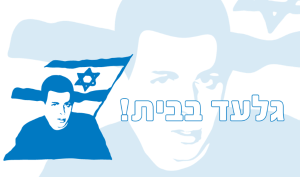An overwhelming majority of the Israeli people is expressing joy on the occasion that Gilad Shalit, the soldier who had been captivated by militant Palestinians five years ago from Israeli territory into the Gaza Strip, could be freed from Hamas’ force according to a swap deal. The price that had to be paid seems high: more than 1000 Palestinian were freed or are going to be freed in stages from Israeli custody. Bereaved families of terror victims, called on the Supreme Court in vain to halt the swap deal that will also set free the murderers of their loved ones.
The fate of Gilad Shalit has moved people in Israel like no other second topic. Moreover, the international public appealed strongly to Hamas to release the captivated soldier. The reason why so many Israelis were able to identify themselves with the fate of one person over such a long period of time is the simple fact that a similar calamity could happen to them. The compulsory military service consists of three years for men and two years for women. The conflict, in which they are being deployed, is not a war country versus country. It is a conflict characterized by asymmetry against an enemy who does not back off from any crime.
Especially that kind of ruthlessness on behalf of Hamas evokes anxious questions and concerns along the joy about Shalit’s release: “Prepare to release the next Shalit”, Akiva Eldar warned in a commentary in Haaretz on October 17, expressing a common discomfort. Keep in mind that Hamas did not become a human rights organization overnight. Instead the swap deal is proof that abductions of Israelis, soldiers in particular, will eventually pay off for the terrorists.
Who is going to benefit politically in the short run from the agreement? At any rate, Hamas. The organization can pull off a propaganda style show in the negotiations’ aftermath. Before the agreement, it lost ground to its rival Fatah operating in the West Bank, because of President Mahmoud Abbas’ September initiative. He gained a lot of respect and popularity among the Palestinian people due to his bid before the United Nations to recognize a Palestinian state.
Furthermore, the current regime in Egypt is on the winning side cashing a tremendous PR dividend. But internationally there is doubt whether the Egyptian policy will remain reliable. The storming of the Israeli Embassy in Cairo by fanatized masses on September 9 calls for a rather skeptical attitude. On the Sinai peninsula, the power monopoly of the state is eroding or has vanished already, the desert is being turned into an arena for islamists. The involvement in the swap deal allowed the Egyptian leadership to evoke the impression that Cairo has still a positive influence on Hamas.
Last but not least, Israel’s Prime Minister Benjamin Netanyahu belongs to the political winners as well. He contributed to the realization of a heart’s desire of his compatriots. At the same time, he showed strength and determination towards his coalition partner Israel Beitenu whose leadership – among others Foreign Minister Avigdor Lieberman – opposed the agreement with Hamas.
Michael Mertes
Translated by Nadine Mensel.
A related interview Michael Mertes had with InfoRadio Berlin-Brandenburg on October 18, 2011, can be accessed here.



